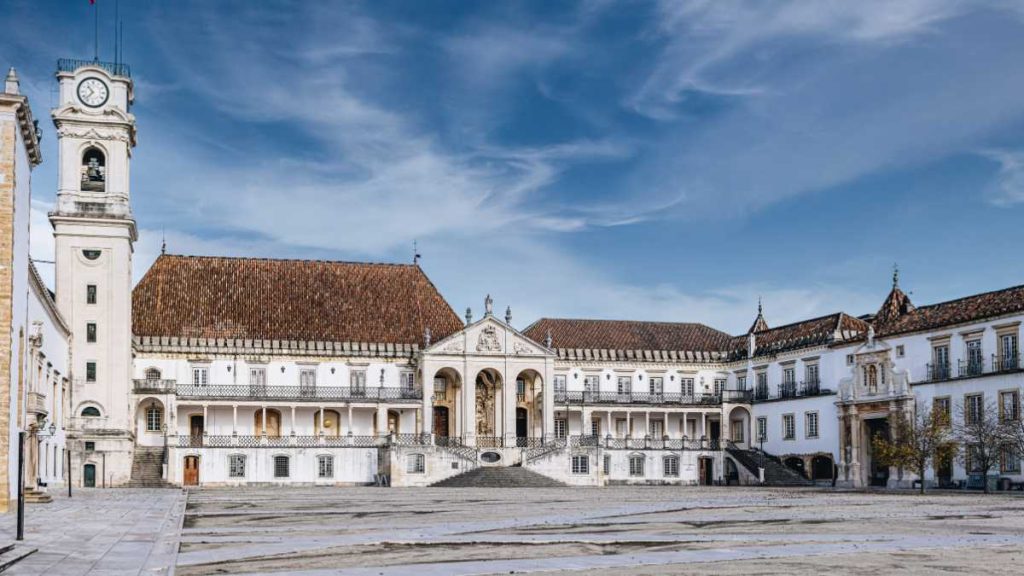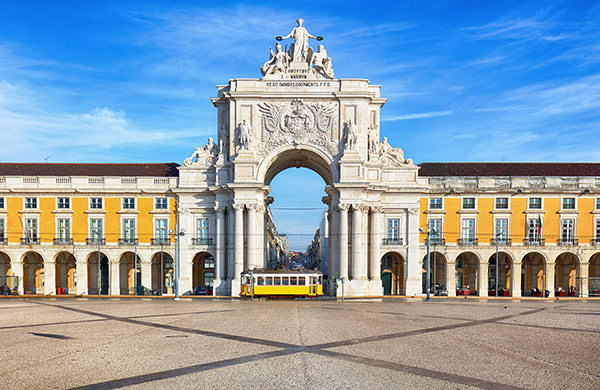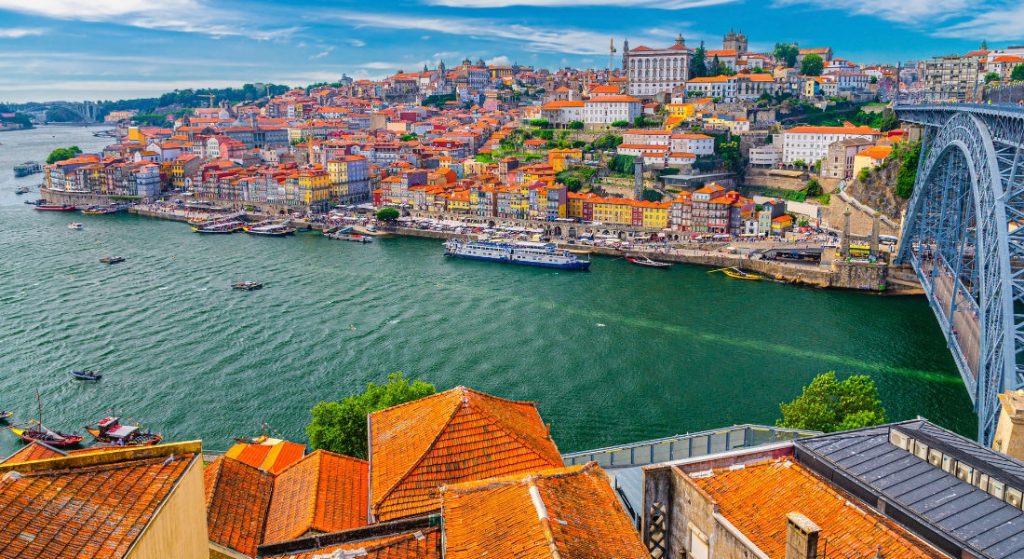Portugal is a country full of contrasts, rich history, vibrant culture, and stunning landscapes. With our 10 days Portugal Tour you’ll have the chance to discover the best the country has to offer, from vibrant cities like Lisbon and Porto, to the magical town of Sintra and the beautiful beaches. Join us on this unique journey through Portugal!
Feel free to contact us now, we will answer any questions about our 10 Days Portugal Tour.
🗓️ Pricing:
| Number of People | Price | Price Person |
|---|---|---|
| 1 Person | 3200€ | – |
| 2 People | 3450€ | 1725€ Per Person |
| 3 People | 3670€ | 1223€ Per Person |
| 4 People | 3800€ | 950€ Per Person |
| 5 People | 3950€ | 790€ Per Person |
| 6 People | 4100€ | 683€ Per Person |
| 7 People | 4250€ | 607€ Per Person |
| 8 People | 4400€ | 550€ Per Person |
Start your adventure in Lisbon, the vibrant capital of Portugal. Begin by exploring the historic Alfama district, famous for its narrow streets and Fado music. Visit Sao Jorge Castle for panoramic views of the city and Baixa-Chiado for a lively cultural experience.
Belem, home to landmarks like the Jeronimos Monastery, the Belém Tower, and the Padrão dos Descobrimentos. Don’t forget to try the famous Pastel de Belem pastry.
10 Days Portugal Tour: Adventure, Culture & Stunning Views!
Take a short trip from Lisbon to Sintra, one of the most magical places in Portugal. Visit the Palacio da Pena, a colorful palace perched on a hilltop, offering breathtaking views of the town and surrounding forest.
Another must-see is the Quinta da Regaleira, a palace with mystical gardens, fountains, and secret tunnels, perfect for those interested in mystery and beauty.
Porto, famous for its Port wine and iconic bridges. Explore the Historic Centre, a UNESCO World Heritage site, and visit the Lello Bookstore, one of the most beautiful bookstores in the world.
Cross the Dom Luís I Bridge to Vila Nova de Gaia, where you can visit the famous Port wine cellars for a wine tasting experience. Porto also has a beautiful riverside area, Ribeira, perfect for a relaxing walk.
Coimbra, one of Portugal’s oldest cities, home to one of Europe’s oldest universities. Visit the stunning Joanina Library and explore the Se Velha and Santa Clara-a-Velha Monastery.
Don’t miss the charming Jewish Quarter and the Machado de Castro Museum, which houses fascinating Roman and medieval art.
Itinerary
We start the day in Parque das Nacoes, a modern area of Lisbon known for Expo 98 and the architecture by Calatrava. Next, we explore Alfama, the oldest part of the city, famous for its narrow streets and Fado, traditional Portuguese music. We will visit the São Jorge Castle, a remnant of Arab civilization, and the Lisbon Cathedral, a Romanesque-style church, where Saint Anthony was born. In the Baixa district, we’ll learn about Pombaline architecture, which arose after the 1755 earthquake. After crossing Avenida da Liberdade, we reach Marques de Pombal Square and Eduardo VII Park, where we’ll enjoy the view. After lunch, we head to Belém, a historic site from the Age of Discoveries. We will visit the Belém Tower, Jerónimo’s Monastery, and the Monument to the Discoveries, ending with a tasting of the famous pastels de Belem.
On the second day, we visit Sintra. We begin at the Queluz Palace (optional visit), where Dom Pedro IV was born, and where the Portuguese royal family sought refuge during the French invasion. The palace is known for its Rococo style and beautiful gardens. Afterward, you’ll have free time to explore Sintra’s charming town center and its craft shops. Don’t miss trying the famous “Travesseiros” at Piriquita pastry shop. Sintra boasts a rich collection of historic monuments, such as the Pena Palace, Quinta da Regaleira, and the Moorish Castle. The guide will assist in choosing up to two palaces to visit. We then head to Cascais, stopping at Cabo da Roca, the westernmost point of Europe. In Cascais, you can explore the charming bay and historic center, where the Portuguese royal family used to spend their holidays. Finally, we pass through Estoril, famous during World War II and home to the Casino Estoril, one of the largest in Europe.
We start the day with a visit to a cork factory, where we learn about the process of harvesting cork from the cork oak, whose bark is stripped every nine years. Portugal is responsible for 55% of the world’s cork production, primarily used for wine bottle stoppers. We then head to Évora, a medieval town that attracts thousands of visitors. A highlight is the Chapel of Bones, with walls covered in human bones. We’ll also visit the Temple of Diana, a legacy of the Roman presence in the city, and the Água de Prata Aqueduct.
Optional: This day could include a visit to a winery in the Alentejo (not included), a region famous for its wines. The region’s warm and dry climate is ideal for producing white and red wines, perfect for tasting.
We start the day in Óbidos, a UNESCO World Heritage site, exploring its narrow, whitewashed streets. The town was a gift from King Dinis to Queen Isabel and has a rich history linked to the Templars and the aqueduct built by Queen Catarina. We’ll also taste the famous “ginja de Óbidos,” a sour cherry liqueur. Next, we head to Fátima, one of the most important Marian shrines in the world. We’ll visit the Chapel of the Apparitions, the Basilica of Our Lady of the Rosary, and the Basilica of the Most Holy Trinity, which houses the tombs of the shepherd children and Sister Lúcia. Finally, we arrive in Coimbra, where we visit the University Palace and the Joanina Library, completed in 1728 and known for its Baroque architecture. It’s important to book tickets for the library visit. In Coimbra, we’ll also explore the Baixa, with its narrow streets, cafés, and shops, ideal for relaxing and enjoying the city’s charming atmosphere.
On the fifth day, we leave Coimbra and head to Aveiro, known as the “Portuguese Venice” due to its canals. We’ll explore the historic center, filled with Art Nouveau buildings, and visit the market designed by Gustave Eiffel. There will be time to try the traditional “ovos-moles” and take a boat ride on a “moliceiro,” similar to a gondola. We’ll also visit the salt pans, which played an important role in the salt industry. Lastly, we’ll see the “palheiros” of Costa Nova, colorful striped houses that were originally fishing warehouses and later became summer residences.
On the sixth day, we visit Porto, the second-largest city in Portugal. We begin at Casa da Música, a modern architectural amphitheater, and continue to Matosinhos and Foz, upper-middle-class areas. In Porto’s downtown, we’ll stroll along Avenida dos Aliados, with the iconic town hall and the statue of Dom Pedro I. We’ll also visit the beautiful São Bento Station, famous for its 20,000 azulejos depicting the history of Portugal. We’ll explore the bustling Rua de Santa Catarina, home to the Majestic Café, a symbol of the “Belle Époque.” Next, we visit the Lello Bookstore, which inspired the Harry Potter series, and Porto Cathedral, as well as the Palacio da Bolsa and the Church of São Francisco. Finally, we cross the Dom Luís I Bridge to Gaia, where we’ll visit a Port wine cellar and the Serra do Pilar Monastery, offering stunning views of the city and the Douro River.
Discovering the Minho region is a journey through history in Guimarães, a UNESCO World Heritage site since 2001. Here, we’ll visit the Castle, the Church of São Miguel, and the Palace of the Dukes of Bragança, exploring medieval streets and charming squares like São Tiago Square. Don’t miss the chance to try a “Santa Clara” pastry. After lunch, we head to Braga, where modernity blends with Roman heritage. We’ll visit the Cathedral, which houses the cross from the first mass held in Brazil, and admire its magnificent pipe organs. The Bom Jesus Park is surrounded by lush forests and features a monumental staircase filled with statues. Here, we can experience the water-powered elevator, the oldest in the world. Finally, we’ll explore the Episcopal Palace, the Santa Barbara Gardens, and República Square, where we’ll feel the city’s vibrant energy and relax in the surrounding chapels and gardens.
We begin our journey in Amarante, where we’ll visit the church and convent of São Gonçalo, known as the matchmaker saint, and admire the 18th-century bridge over the Tâmega River. Next, we head to Vila Real, specifically to the parish of Mateus, to explore the Mateus Palace, famous for its Baroque architecture and for producing Mateus Rosé wine. We’ll then continue to the Upper Douro, where we can enjoy breathtaking views from the Casal de Loivos viewpoint and visit the Pinhao train station, which features tile panels depicting the history of wine production. This region was recognized by UNESCO as a World Heritage site in 2001. Finally, we’ll have the option to visit a “Quinta” (not included), where we’ll learn about the entire wine production process, from cultivation to tasting.
On this day, we start with a visit to Lamego, specifically to the Sanctuary of Our Lady of Remedies, famous for its 18th-century staircase that leads to the top of Mount Santo Estêvão. This site is a symbol of devotion to the city’s patron saint. Next, we head to Serra da Estrela to climb to Torre, the highest point in mainland Portugal, at 1,993 meters. This region is known for its winter snow, being home to the only ski resort in the country. We’ll have the opportunity to visit the Bread Museum in Seia, dedicated to preserving the heritage of Portuguese bread, with a collection of objects related to this essential food. We continue to Monsanto, one of Portugal’s historic villages, known as “the most Portuguese village in Portugal.” With traces of settlement dating back to the Paleolithic, Monsanto was donated to the Knights Templar by King Afonso Henriques after its conquest from the Moors. The village, perched on a hill, offers an authentic and tranquil atmosphere.
🛌 – Overnight in Monsanto
On our tenth day, we head to Tomar, known as the city of the Templars. We’ll explore the medieval part of the city, starting at Praça da República and the Main Church, with the Castle and Convent of Christ in the background. Tomar is famous for its traditional commerce and for the oldest café, known for its almond queijadas and “Fatias de Tomar,” made solely with egg yolks. We’ll also visit the Church of Santa Maria do Olival, headquarters of the Templar Order, where Gualdim Pais and other grand masters are buried. The church is an important example of Gothic art in Portugal. After that, we continue to Santarém, where we visit the tomb of Pedro Álvares Cabral, the famous explorer who discovered Brazil, and we’ll have time to explore the city and the Church of the Holy Miracle.

























